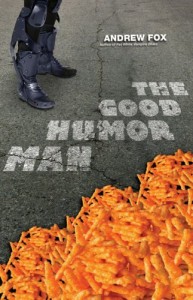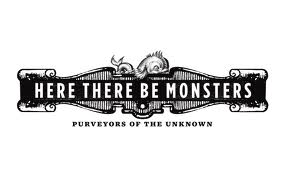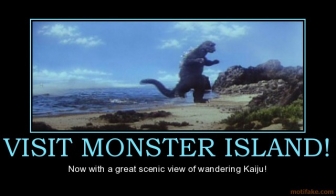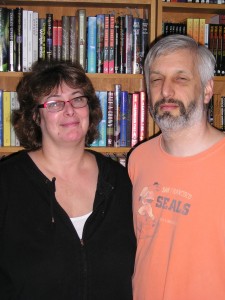
I have a tremendous amount of fondness for the science fiction community, both professionals and fans. The SF community was boundless in their generosity and support for me and my family in the aftermath of Hurricane Katrina, and Dara, the boys, and I have all benefitted from the friendships we’ve formed at dozens of conventions and bookstore events over the past decade.
But I feel compelled to point out, or at least suggest, that a vocal and very cyber-visible portion of the SF pro and fan community have not been covering themselves in glory recently. In fact, they have been acting like a mob. A cyber-mob. And a mob is an ugly thing.
Unfortunately, the worst harm to the target of criticism comes not from individual critiques (which vary greatly in their quality of argument; many critiques that I’ve come across do not rely upon any familiarity with the source documents of the controversy at all, merely upon commentary derived from those documents and unsubstantiated assumptions about authorial intent). Individual critiques at least come from individuals, persons who can be responded to and perhaps even persuaded that the critique target’s intentions were not so malign/evil after all. Rather, the worst harm comes from the aggregated mass of such critiques, which tends to snowball, and which unfortunately has snowballed, from the members-only online discussion forums of the Science Fiction and Fantasy Writers of America to hundreds, if not thousands, of personal blog posts, Facebook posts, and Twitter tweets, and finally to such mainstream publications as Britain’s Guardian newspaper and Slate, the online magazine, which are read by millions who most likely otherwise would have no notion whatsoever of flaring controversies inside the insular subculture of science fiction writers and fans. Once such critiques reach a critical mass and begin snowballing in this way, they become a creature out of the control of any individual actor. This is how reputations are irreparably damaged and careers are thrown off the rails, if not destroyed.
Did the original criticizers want this to happen? In an attempt to be charitable and fair, I will assume that many, if not most, did not. They wanted to make their displeasure known; some wanted to provoke changes which they felt needed to be made in SFWA and its management of the SFWA Bulletin. Some of the criticizers, however, caught up in the adrenaline rush provided by participation in a large group expression of shared moral outrage, are undoubtedly pleased at whatever lasting harm might be done to Barry N. Malzberg and Mike Resnick, the authors of the articles which prompted the online firestorm, and Jean Rabe, the former editor of the Bulletin who commissioned the articles (and who has since resigned her position under pressure).
A bit of self-disclosure: I’ve met Mike Resnick on a couple of occasions at conventions (and I bought some magazines once from him on eBay, too). During our brief conversations, he was cordial, sensible, and seemed to be paying attention to what I had to say (which was either about the writing biz or our shared friendship with Barry). Barry Malzberg, on the other hand, has been a close friend of mine for the past ten years. He has been tremendously gracious and generous during our long correspondence. I have visited him and his wife at their home in New Jersey. Most striking to me have been the reactions of other SF professionals when I’ve mentioned my friendship with Barry. A number of them have shared accounts with me of how Barry reached out to them during low points in their writing or editing careers or personal lives, and how his encouragement, support, and assistance had made a great, positive difference for them. Barry has never discussed any of this with me. But it seems as though if the field of science fiction has a secret saint, that person is Barry Malzberg.
I came late to this particular controversy. This storm has been gathering strength for the past seven months, since the distribution in November, 2012 of issue 200 of the SFWA Bulletin to about 2,000 SFWA members, subscribers, and a thousand or so readers who purchase their copies from a newsstand or bookstore. But the brouhaha truly began blowing up online in late May of this year, after distribution of issue 202 of the Bulletin. I’ve been a SFWA member for the past ten years, so I receive the Bulletin every three months as a perk of my membership. Mike and Barry have been contributing a regular column to the magazine, the Resnick/Malzberg Dialogues, since 1998. The column generally consists of the two of them, both old science fiction pro writers whose careers in the field date back to the late 1960s (Barry won the first ever John W. Campbell Memorial Award in 1973, and Mike was the Guest of Honor at the most recent WorldCon, Chicon 7), bantering back and forth on issues of current import to the publishing world or its science fiction and fantasy corner (such as the emergence of small presses or self-publishing), matters of writerly advice (how to best find an agent or decipher a publishing contract), or surveys of various aspects of the history of the science fiction field (such as the history of women science fiction and fantasy authors and women editors and publishers in the SF field… the stealth minefield onto which they blithely trod in issues 199 and 200 of the SFWA Bulletin). I usually make it a habit to read the newest Resnick/Malzberg Dialogue as soon as I receive my copy of the Bulletin. But starting with issue 199 (the Fall, 2012 issue), my copies of the Bulletin began accumulating on my nightstand, waiting to be read, pushed down on my reading list by big, thick Russian novels and various research books.
It wasn’t until this week that I glanced at the Locus Online website to catch up on SF news and book reviews (I’d also been neglecting both the print and online versions of Locus) and saw a link to the Guardian Online article that I reference above, entitled “Science fiction authors attack sexism in row over SFWA magazine”. Reading it, I learned that Mike and Barry were at the center of an online controversy over alleged sexism in SFWA, which focused both on several of their recent columns and the cover to issue 200 of the Bulletin, which featured an iconic image of a barbarian woman warrior/goddess in a chainmail bikini, brandishing her bloody sword over the corpse of a Frost Giant. The article provided a link to an online roundup of commentary from dozens of science fiction professionals, would-be professionals, and fans. Perusing this long selection of snippets, seventy-six of them at last count, I noted the following epithets being applied to Mike and Barry or to their words: unprofessional (the kindest of the lot), wankers, regressive, outdated, condescending, sources of “sexist douchebaggery,” “misogynistic, irrelevant dinosaurs,” “old men yelling at clouds,” “majority men in power,” “hideous, backwards, and strangely atavistic,” “blithering nincompoops,” antiquated, “deeply offensive,” “at best stupid and at worst censorious,” “sexist dippery,” gross, “never ending stream of sexism,” shitty, prehistoric, and, perhaps most colorful, “giant space dicks.” Also linked to on this list was a charming blog post entitled, “Dear Barry Malzberg and Mike Resnick: Fuck You. Signed, Rachael Acks” (which, incidentally, is the #3 search result of 187,000 results when you type in the words Barry Malzberg into Google’s search bar).
Holy bejezzus, I thought to myself as I read through this list. What did Mike and Barry do? Had they gone all Westboro Baptist Church in one of their recent columns?
I went home that night and dug my most recent four issues, all previously unread, of the Bulletin out of my “to be read” pile. And I read all four Resnick/Malzberg Dialogues in order (the Dialogue from issue 201 plays no part in the brouhaha).
Never in my forty-eight years have I witnessed such an immense chasm yawning between an inciting incident and the level of vitriol it inspired.
Let me provide a bit of background. In their fifteen years of writing Dialogues together (I’ve read about three-quarters of their columns), Mike and Barry have developed a comfortable, familiar, semi-comedic shtick, complete with complementary personas (Mike is the can-do, look-on-the-bright-side face of the duo, whereas Barry typically luxuriates in his role as the Eeyore of science fiction). Both gentlemen are in their seventies and have been around the block many, many times, so quite a few of their columns, particularly the retrospective, survey-of-the-field entries, have a “those were the days” sensibility to them. They strive to share with their readers a feel for what it might’ve been like to belly up to the bar at the 1975 WorldCon and eavesdrop on the shop talk and gossip of some of the “old pros.” I readily admit that I eat this kind of stuff up; I’m a buff for any in-depth history of the field, replete as it is with such colorful personalities and their exploits, and I’ve happily devoured Barry’s, Fred Pohl’s, Jack Williamson’s, and Damon Knight’s memoirs over the years. Mike’s and Barry’s sensibilities in their columns cannot be fully appreciated unless one understands that they were both fans before they ever became professionals. They love science fiction and its traditions, and they are passionate about it. Having both been active in the field, either as aficionados or as pros (frequently as both), for going on fifty-five years, they have a wealth of personally experienced or second-hand anecdotes to share, and they delight in doing so. When writing their surveys of the field, whether they are focusing on writers, editors, publishers, agents, or artists from the Golden Age of SF to the present day, they try to insert some colorful anecdotes about each notable they discuss, in order to flesh out the personalities of oftentimes obscure, forgotten, and/or long-dead figures. Barry, in particular, has dedicated a large chunk of his career to attempts to rescue beloved predecessors from the darkness of obscurity (see the essays in his The Engines of the Night, Breakfast in the Ruins, The End of Summer: Science Fiction of the Fifties, The Science Fiction of Kris Neville, The Science Fiction of Mark Clifton, and Neglected Visions). Both men enjoy gossip, the sort of stories which used to be (and maybe still are) traded back and forth at convention bars, and given the tangled, intertwined personal histories of many major figures in the field (multiple tomes have been written about the love lives and swapped spouses of the Futurians, just to cite one example), there is a lot of old gossip to share. (And in case you consider this a strike against them, please ponder the high percentage of even the highest-toned literary biography which is composed of what is actually well-sourced gossip.)
The editor of the Bulletin, Jean Rabe, asked Barry and Mike to write a column or two on the history of women in science fiction. This request resulted in two columns, published in issues 199 and 200, entitled “Literary Ladies: Part One” (focusing on writers) and “Literary Ladies: Part Two” (focusing on editors and publishers). One of the pair (I suspect it is Mike) has a longstanding weakness for alliteration; thus, the “LL” of “Literary Ladies.” In accordance with the titles of the articles, Mike and Barry frequently (but by no means exclusively) refer to their subjects as “lady writers,” “lady editors,” or “lady publishers” (there are a few “lady agents” mentioned, too).
This use of “lady” as a modifying adjective is one of the primary complaints the legions of critics online have hurled at Mike and Barry, a main plank in their contention that the pair are “reactionary, shitty, prehistoric, misogynistic, giant space dicks” (to mash up just a few of the pejoratives I’ve quoted in the list above). Now, maybe it’s just me, but I have never encountered the use of the word “lady” as a pejorative or even as having a negative connotation. At least when I was growing up, it was a compliment, a label for those of the female gender to aspire to. Is the word a bit old-fashioned? Sure. Does it have a bit of a musty smell about it? A case could certainly be made. Is it mean-spirited? Hell, no.
And that’s before we even get to the actual content of these two articles. Barry and Mike praise their pantheons of women writers, editors, and publishers to the skies! They idolize many of them. Far from giving them condescending pats on the head, they fully recognize the daunting social handicaps these women faced in the professional world of publishing prior to the 1980s and cite them as enterprising, talented, and incredibly driven pioneers. There are no snide put-downs in these articles; there are no put-downs at all. These articles were labors of love. Mike and Barry knew that some of the women they’d be discussing would be familiar to the Bulletin readership, but that many would not be (particularly the women editors of such magazines as Weird Tales, Amazing Stories, and Fantastic from the 1930s, 1940s, and 1950s). Even I, a pretty well-read amateur historian of the field, found myself encountering personalities of whom I had no prior knowledge. Mike and Barry did a service for both their readership and for many otherwise forgotten notables in our field, women who they state had as big an impact on the evolution of science fiction and fantasy in America as John W. Campbell, Edgar Rice Burroughs, and Robert Heinlein did. (And, as has been said about Ginger Rogers when comparing her skills to those of her partner Fred Astaire, they did it dancing backwards.)
The other sin laid upon the heads of Mike and Barry regarding their “Literary Ladies” articles is that they mentioned the physical attractiveness of some of their subjects. In sharing an second-hand anecdote about how one of the few women editors of the 1950s had prompted many women to join a previously all-male Cincinnati, Ohio fan organization, Mike mentioned the editor, briefly the only female participant in the club, had looked quite beautiful in a bikini at the hotel pool of a local convention – causing the wives of the male fans to join the club in order to keep an eye on their husbands! The original teller of the anecdote was the wife of one of those male fans, who told Mike that the editor, later a close friend, had earned the wife’s everlasting gratitude for sucking her into fandom. Reading it, I’m sure Mike intended it to be an amusing and endearing anecdote, a window into the world of SF fandom (and the larger society) of the 1950s. For many readers, apparently, it didn’t come off that way. But I’m judging the man on what I reason his intentions to have been, and I firmly believe intentions must be given weight in situations such as this one, which come down to one subjective experience versus another.
In another instance, Barry comments on the physical beauty of a woman editor from the 1920s and 1930s, a woman he only knows from her photographs and from the body of work she left behind. Again, I see his comments as an attempt to add a third dimension (I could say “flesh out” or “add skin and sinew to the bones,” but I would risk being misinterpreted, wouldn’t I?) to an otherwise dry recitation of the woman’s accomplishments in the early SF field. I have shared Barry’s experience in having surprising beauty leap out at me from a vintage photograph, beauty which could not be cloaked by the alien or frumpy (to me) clothing, makeup, and hairstyles of the era. Some people are exceptionally beautiful, and it is noteworthy, even when writing about writers (or editors). Nearly all accounts of Jack Kerouac’s career dwell upon his magnetic, athletic handsomeness as a young man, and how iconic photographs of him have helped to build his enduring mystique. Somewhat similarly, Franz Kafka’s striking appearance and demeanor, preserved in a handful of photographs and reminiscences of his contemporaries, have been grist for the mills of dozens of biographers. Kafka’s last lover, the Czech writer, editor, and social activist Milena Jesenka’, was a beautiful woman; her biographer and friend, Margarete Buber-Neumann, wrote extensively about Milena’s beauty and the effect it had upon the people (men and women) around her, and how she suffered from her beauty’s degradation in the German concentration camp where she perished.
The last set of complaints about Mike and Barry have to do with their column from issue 202 of the Bulletin, entitled “Talk Radio Redux.” This column was a response, an obviously emotional one, to the sorts of criticism (see my summary above) which had begun filtering back to them regarding their two columns on “Literary Ladies,” criticism with which revulsion of the woman warrior cover to issue 200 had gotten conflated. This set of complaints focuses on Mike’s using the words “censorship” or “attempted censorship” when referring to the feedback and actions of some of the readership and to Barry’s use of the term “liberal fascist.”
“Liberal fascist” is a term that has its origin in (or at least can trace its popularization to) Jonah Goldberg’s 2009 book, Liberal Fascism: the Secret History of the American Left, from Mussolini to the Politics of Change. The book is an account of the influence that certain aspects of Woodrow Wilson-era Progressivism (the ancestor of today’s Progressive movement), such as promotion of eugenics, an emphasis on the growth of state power and control of the state over key industries during times of state-declared emergency, and proto-environmentalism/nature worship, had on the various flavors of European fascism which developed and flourished during the 1920s and 1930s. The book also makes note that, in contrast with the commonly held belief that fascism was a rightwing movement, Benito Mussolini and the German and Austrian founders of the National Socialist Workers’ Party saw themselves as men of the Left, emerging from and expanding upon the Socialist tradition in a way separate from (and opposed to) Communism.
Personally, I think Barry was a little off in his use of the term “liberal fascist,” although I understand the emotion behind his use of the words. Fascists are defined in part by their intentions and efforts to use the powers of the state to silence opposing viewpoints. None of Barry’s and Mike’s critics have tried to do that (although perhaps some may fantasize about it). Similarly, Mike was imprecise when he used the word “censorship.” Censorship implies either the use of state power to silence an individual or the actions of an entity with economic power over an individual (such as the individual’s publisher) to block or change that individual’s expressions, under threat of economic penalty. Again, none of Mike’s and Barry’s critics are in a position to be censors. What they have been doing, however, does have its roots in an authoritarian tradition separate from, although related to, fascism. Mike and Barry have been mau-maued. Mau-mauing (a term popularized by Tom Wolfe in his 1970 account of the New Left of the 1960s, Radical Chic and Mau-Mauing the Flak Catchers) is a form of intimidation through widespread social shaming, ostracism, confrontation, and (either implied or explicit) threats. Although it is associated with the New Left, it has its origins in the standard operating procedures of the Old Left, when Communist parties in the Soviet Union and throughout the West utilized self-criticism and group criticism sessions to enforce groupthink and to stamp out nonconforming ideas and ideologies. (Many former American Communists of the 1930s listed the 180 degree turn from “Hitler is our mortal enemy” to “Hitler is our ally” following the 1939 Molotov-Ribbentrop Pact and their horror at the reeducation sessions which ensued as crucial to their break with the Party.) Saul Alinsky, in his Rules for Radicals, listed as Rule #12, “Pick the target, freeze it, personalize it, and polarize it,” an endorsement of the technique of mau-mauing. Numerous American universities, both public and private, now staffed by professors and administrators who often have ties to or have been influenced by the New Left, have instituted speech codes which explicitly define certain forms of student speech and expression as being outside the bounds of permissible activity on campus, subjecting offenders to administrative penalties up to expulsion (a move to institutionalize and bureaucratize mau-mauing, pushing it towards what could be formally defined as censorship). Coincidentally, the same years which have witnessed the emergency of speech codes on many campuses have also witnessed an accelerated symbiosis between the pro SF community and academia (in that greater numbers of SF/fantasy writers have as day jobs teaching at the post-high school level, and SF literature and film has become an increasingly respectable and popular subject of university courses).
Given the prevalence of academic jargon from Cultural Studies or other Studies departments in their comments, I imagine a goodly number of the criticizers on the SWFA discussion boards and the broader Internet are either university instructors or possessors of an advanced degree from one of those programs. For many individuals under the age of forty who have been through the university system, mau-mauing may seem normative, or at least unremarkable. They have seen it at work through divestment campaigns of various kinds (divestment from Israeli companies or U.S. companies which provide goods to Israel which might be used in security operations against Palestinians, or from companies involved in fossil fuel production, or from companies connected to certain figures active on the Right, such as the Koch brothers) and through shout-downs and other disruptions of speakers invited to campus whose backgrounds or viewpoints are contrary to those favored by student activists.
Many of the criticizers may not consciously realize that they are mau-mauing Mike and Barry, but mau-mauing is what they are engaged in. Some commentators have pointed out the criticism is not censorship. True; but in this instance, rather irrelevant. Other commentators have stated that freedom of speech does not imply a right to a paid platform (such as that enjoyed until now by Barry and Mike with their quarterly columns for the Bulletin). Again – true, but irrelevant. For what the protesters either seek to do or end up abetting is not censorship, but what can be called shunning and shaming, an application of a radioactive aura to these two men which will make not only the future editors of the Bulletin but also editors at other periodicals and publishing houses, organizers of conventions, literary prize juries, and media outlets shy away from wanting any connection with these two and their works. Remember, this story has now broken out into mainstream outlets such as Salon and the Guardian; people who previously had never heard of Mike Resnick or Barry Malzberg or any of their books will now have their initial (and most likely only) impression of them branded with a scarlet “S” for “Sexist,” as detrimental a negative label in our time as “Adulterer” was in the time of the Puritans. As Barry himself stated in the column “Talk Radio Redux,” the most potent form of censorship is self-censorship, the type that occurs in a writer’s head before he or she sets fingers to keyboard. The mau-mauers, consciously or not, are using Mike and Barry as cautionary examples – “Look what we’ve been able to do to the reputations of a WorldCon Guest of Honor and to a man who has written close to a hundred novels and over 250 short stories, several nominated for Hugo or Nebula Awards. If we could do this to them, what do you think we could do to you if you commit ThoughtCrime?”
The virtually thoughtless piling on is perhaps the most appalling. So many of the criticizers whose comments I have come across admit they haven’t even read the columns in question. Once the ball of shunning and shaming got rolling, hundreds of onlookers, alerted by social media, jumped on the bandwagon, attracted by the enticing glow of participating in shared moral outrage. Moral preening is on overload; industry professionals and would-be professionals frantically signal to each other that they are right-thinkers. According to the mau-mauers, Mike and Barry did not merely misspeak (miswrite?); they did not have decent-enough intentions which were ruined by Paleolithic habits and blinkered upbringings; they are morally suspect, malign and vicious and evil. It’s burn the witch! all over again, but this time on a pyre of blog posts and Tweets.
I mentioned before that I completely understand the vehemence of Barry’s reaction to all this. One sadly ironic aspect of this brouhaha is that Barry is a lifelong man of the Left. He was staunchly antiwar during the Vietnam era (see early stories such as “Final War”), and his dream president was (and remains) Eugene McCarthy. I fully believe, based on his writings about Alice Sheldon and Judith Merril, that Barry considers himself a feminist, and an avid one. Condemnation from one’s “own side” always burns hotter in one’s craw than condemnation from “the other guys,” which can be easily rationalized away; just as criticism (especially when viewed as unfair) from one’s own family hurts much worse than criticism from relative strangers. Forty years ago (and in all the years since), Barry was a fierce advocate of the New Wave in science fiction, whose practitioners (with the sole exception of R. A. Lafferty) were all politically aligned with the Left, as opposed to old-timers such as John W. Campbell and Robert Heinlein. Now Barry must feel as though the children of the Revolution are eating their elders (as so frequently happens, it seems).
You still don’t think swarm cyber-shaming is a genuine phenomenon? Here’s a statistic for you. As of this afternoon (June 19, 2013), typing in the three words, Barry Malzberg sexist, into the Google search bar produces 807,000 results (oddly enough, far more than the 187,000 results you get in you only type in two words, Barry Malzberg). In contrast, typing in the author’s name and the title of his best known novel, Beyond Apollo, winner of the first John W. Campbell Memorial Award for Best Science Fiction Novel, produces 41,000 results.
Folks, this is insane.
I do not believe there was any conspiracy to do this to Barry and Mike. I believe this smear started on a small scale and then grew like mutant kudzu in the echo chambers of the web. Now the smear has metastasized into a Frankenstein’s monster which has escaped the control of any individual or organization; with that much mud out there, no amount of counter-narrative will ever wash it away.
One of the cruelest knives shoved into Barry’s back was the alteration of his Wikipedia entry. Now, thanks to an anonymous interloper with a baleful lack of perspective, more text is given over to this current incident (a full paragraph) than is devoted to Barry’s considerable and award-nominated nonfiction work (no mention at all). Whoever performed this small act of vandalism (also done to Mike’s entry) is a lout and a bully.
Unfortunately, this is not the first instance of swarm cyber-shaming in the science fiction community, and I fear it will not be the last (what produces results tends to get repeated). The first eruption was that which surrounded Orson Scott Card when he publicly affirmed tenets of his religion, Mormonism, concerning homosexuality. Recently, his swarmers attempted to shame/pressure DC Comics into never hiring Card again, after he did a work-for-hire story for a DC Comics anthology. “RaceFail” was the tag applied to a 2009 online dustup regarding various professionals’ comments on, and then comments on the comments, and then comments on the comments on the comments about the handling of racial issues and identity in science fiction. In 2010, we had WisCon, the renowned feminist science fiction convention, disinvite award-winning author Elizabeth Moon as their Guest of Honor due to comments she made on her blog about the surprising forbearance non-Muslim Americans have shown their Muslim fellow residents in the years since September 11, 2001 (as opposed to the myth of a rising tide of Islamophobia in the U.S.). And now we have this… Old FogeyFail? I was very disappointed to see on the list of Barry’s and Mike’s most vocal condemners a very prominent editor for a very big imprint who complained bitterly in 2009 about his unfair treatment at the hands of fans and fellow pros after he made some comments about the RaceFail affair; his wife (another prominent SF pro) got on various message boards to scold the scolds for going after her husband and contributing to his depression. Now, obviously a victim of Stockholm Syndrome, this same editor seeks to reestablish his bona fides with the mau-mauers by doing unto Barry and Mike what was done unto him. Shame on you, sir.
From the website Judaism 101:
A Chasidic tale vividly illustrates the danger of improper speech: A man went about the community telling malicious lies about the rabbi. Later, he realized the wrong he had done, and began to feel remorse. He went to the rabbi and begged his forgiveness, saying he would do anything he could to make amends. The rabbi told the man, “Take a feather pillow, cut it open, and scatter the feathers to the winds.” The man thought this was a strange request, but it was a simple enough task, and he did it gladly. When he returned to tell the rabbi that he had done it, the rabbi said, “Now, go and gather the feathers. Because you can no more make amends for the damage your words have done than you can recollect the feathers.”
I’ve warned my fellow writers and creators about too blithely plunging into online controversies, dropping their pants on social media, and wearing their political affiliations as neon tattoos. Why risk alienating half your potential audience? I also said that one must pick one’s battles carefully; issues and situations may arise which outweigh one’s potential financial/career interests, and which one can avoid engaging in only at the risk of one’s self-worth.
For me, this is such an issue. Barry Malzberg is a friend; more than that, he is a profoundly decent and kind human being. I cannot stand idle while this good man’s reputation is unjustly tarnished. The old saying is that bad speech can only be combatted with good speech. As I wrote above, I fear that in this Internet Age, the mud gets replicated so fast and so incessantly that it can never be washed away. I’ve gone on much longer than I originally intended, wanting to wash away as much mud as I can. My washcloth is small, unfortunately. But it won’t go unused.
Update on June 22, 2013: Thanks to Glenn Reynolds for the link, which brought in so many new readers. I apologize that I haven’t been able to respond to each of the comments. My main computer is in the shop, and the boys are begging me to take them swimming. If you’d like to support Barry, his most recent book of essays, Breakfast in the Ruins, is excellent, a fantastic read for anyone with an interest in the science fiction or mystery fields. Also, Mike and Barry have collected many of their Dialogue columns into a book called The Business of Science Fiction.
Update #2 on June 24, 2013: The Los Angeles Review of Books features this very detailed, incisive review of The Very Best of Barry N. Malzberg, which has just been released… a compendium of what Barry considers the best of his more than 350 short stories. Along with Breakfast in the Ruins and The Passage of the Light: the Recursive Science Fiction of Barry N. Malzberg, this new collection is an essential introduction to Barry’s huge body of work.
Like this:
Like Loading...




























